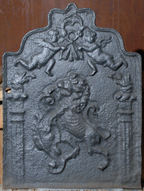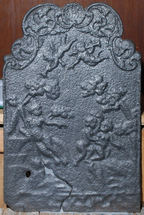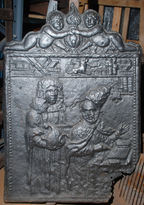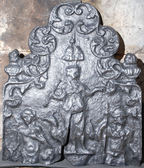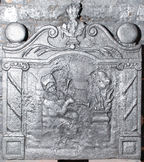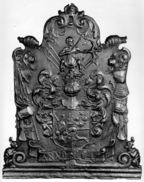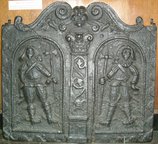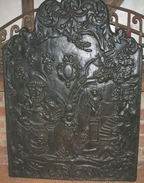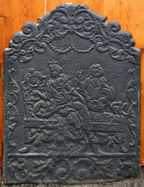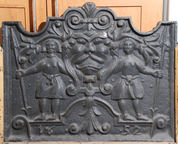-
210
Description: Quasi-arched rectangular shape; ovolo-moulded edging; fluid curving, double ovolo arch with a pair of putti holding looped ribbons; a lion rampant holding a cartouche, between two pilasters, each surmounted by a dragon’s head.
Notes: A simple decorative device has replaced the customary allegorical or classical scene.
Copies of this fireback are known.
- Decoration tags:
- rectangular with ornate arch (shape)
- ovolo (edging)
- whole carved pattern
- pictorial
- animals
Manufactured: in the late-17th century in England.
Current location: Brighton Museum and Art Gallery, Brighton, East Sussex, England.
Museum number: HA105020 (part of the Brighton Museum museum group)
- Attached to series:
- Late pictorial series (all)
- Late pictorial series 5
-
214
Description: Rectangular with arched, mirrored scrolls on top and central scallop shell; fillet edging; in a grove with two putti above, blowing trumpets, to the left, a naked female figure seated against a table, pointing at three children to the right, on a rock; at the bottom, narrow panel with indistinct decoration.
Notes: The scene is probably from classical mythology, but has not been identified.
Copies of this fireback are known.
- Decoration tags:
- rectangular with ornate arch (shape)
- fillet (edging)
- whole carved pattern
- pictorial
- mythological
- humans
- plants
Manufactured: in the early-18th century in England.
Current location: Brighton Museum and Art Gallery, Brighton, East Sussex, England.
Museum number: HATMP002269 (part of the Brighton Museum museum group)
- Attached to series:
- Late pictorial series (all)
- Late pictorial series 2
-
216
Description: Rectangular with plait-effect border and a column of beads down each side; pictorial scene of a male figure in gown and full-bottom wig, holding a fool’s cap in his right hand, standing behind a seated male figure, bald and bearded, with the papal triple crown falling off his head; he is seated at a desk on which are two books; behind him and to the right, three books are on a small shelf. Above the figures, a longer shelf, the width of the plate, supports other books and papers, together with the figure of a dog, from whose mouth a scroll issues bearing an unreadable inscription. On top, two putti hold hands in front of a flaming grenade.
Notes: The design is copied from a cartoon of c.1672 showing Titus Oates, the instigator of the Popish Plot, presenting a fool’s cap to the Pope.
Copies of this fireback are known.
- Decoration tags:
- rectangular with ornate arch (shape)
- bead (edging)
- whole carved pattern
- pictorial
- humans
- objects
Manufactured: in the mid- to late-17th century in England.
Current location: Brighton Museum and Art Gallery, Brighton, East Sussex, England.
Museum number: HA105014 (part of the Brighton Museum museum group)
- Attached to series:
- Commemorative firebacks
-
25
Description: Quasi-arched rectangular shape with arch decorated with floral swirls and an urn on each shoulder; three female figures: Aphrodite on the left, Hera in the centre on a plinth with two peacocks behind her, and Athena on the right; a double tassel hangs above Hera’s head.
Notes: The figures are the participants in the Judgement of Paris, the outcome of which precipitated the Trojan War.
Copies of this fireback are known.
- Decoration tags:
- rectangular with ornate arch (shape)
- fillet (edging)
- whole carved pattern
- pictorial
- mythological
- humans
Manufactured: in the early-18th century in England.
Current location: Bateman's, Burwash, East Sussex, England.
Museum number: 761070 (part of the National Trust museum group)
- Attached to series:
- Late pictorial series (all)
- Late pictorial series 4
-
27
Description: Arched rectangular shape with symmetrical scrolled ‘portico’ above, a flower vase between and circular discs at each end, symmetrical horizontal palm fronds below; pilaster with spiral design and Ionic capital on each side; central pictorial scene of a bagpiper with Elizabethan ruff and soft cap with feather in front of a vaulted ruin, on the right a flaming cauldron on a plinth.
Notes: This seems to be pastiche using various elements derived from other firebacks, notably the moulding and scrolled top are from the Lenard fireback , and the palm fronds are from elsewhere. The figure may be adapted from a painting of a bagpiper by Abraham Bloemaert (1564-1651).
Copies of this fireback are known.
- Decoration tags:
- rectangular with ornate arch (shape)
- none (edging)
- whole carved pattern
- pictorial
- humans
- objects
Manufactured: in England.
Current location: Bateman's, Burwash, East Sussex, England.
Museum number: 761118 (part of the National Trust museum group)
- Attached to series:
- British 'Dutch' style firebacks
-
1030
Description: Quasi-arched rectangular shape upon a moulded plinth; on a background comprising foliate swirls, a central shield, helm, coronet and elaborate mantling, with a crest of a forward facing centaur armed with a drawn bow pointed to the sinister side, and behind which are six pennons, three each side display in a v-shape; to the left, a triumph comprising a drum, draped flag on pole, concealing an arquebus, halberd and breastplate, and a broad-brimmed hat with feather; to the right, a triumph comprising a drum, a breast plate and tassets, a powder horn, and partially concealed arquebus, sword and spear, and a broad-brimmed hat with feather; at the base, a horizontal fillet with scrolled ends and squatting 'rodents'.
Notes: An uncharacteristic fireback designed and cast for the family of Joan Huydecoper (1625-1704). A variant without the base plinth and 'rodents' is in the collection of Museum Rotterdam (inv. 15224).
Inscription: ANNO 1647
Arms: Joan Huydecoper
- Decoration tags:
- rectangular with ornate arch (shape)
- complex individual (edging)
- whole carved pattern
- heraldic
- armorial
- text
- humans
- objects
Manufactured: in 1647 possibly in the Siegerland area of Germany.
Current location: Rijksmuseum, Museumstraat, Amsterdam South, North Holland, Netherlands.
Museum number: BK-1978-19 (part of the Rijksmuseum museum group)
- Attached to series:
- 'Dutch' Miscellaneous Firebacks
- Foreign armorial firebacks
-
81
Description: Rectangular with two mirrored scrolls on top, a lion’s face between; bas-relief semi-circle edging (sides and bottom); central pilaster with vine scrolling, Corinthian capital, initials on the pedestal; on either side, an arched alcove, each with a halberdier in mid-17th century clothes, their feet pointing to the middle.
Notes: Stylistically similar to the Lenard fireback (no. 429), the initials also appear on other firebacks. All known examples of this fireback are poorly modelled and cast. A rare version (no. 400) has different edging and lacks the pattern-maker’s initials. Inferior copies of this fireback were advertised in Kings Worthy Foundry's (Winchester) catalogue in the mid-20th century.
Copies of this fireback are known.
Inscription: IM
- Decoration tags:
- rectangular with ornate arch (shape)
- fillet (edging)
- whole carved pattern
- planklines
- pictorial
- architectural
- text
- humans
Manufactured: in the early- to mid-17th century possibly at Brede Furnace in the Weald area of England.
Current location: Guildford Museum, Guildford, Surrey, England.
Museum number: S.7108 (part of the Guildford Museum museum group)
Citation: Lloyd, N., 1925, 'Domestic Ironwork I', Architectural Review, 58, pp. 58-67.
- Attached to series:
- IM series
- Brede group
-
86
Description: Quasi-arched rectangular shape; fillet edging; central female figure with urn on head, above which is an oval cartouche (possibly a mirror); to left, fireplace with basket grate, above which a lobster and another (unidentified) creature bear a covered vase; to right a seated female figure stretches forth her left arm, behind her is a statue of a female figure on a plinth at the foot of a curving flight of stairs; the whole is surrounded by naturalistic rocks and trees, suggesting a grotto.
Notes: An unusually free pictorial decoration.
Copies of this fireback are known.
- Decoration tags:
- rectangular with ornate arch (shape)
- fillet (edging)
- whole carved pattern
- pictorial
- humans
- plants
- objects
Manufactured: in the early-18th century in England.
Current location: in private hands, Hadlow Down, East Sussex, England.
- Attached to series:
- Late pictorial series (all)
- Late pictorial series 4
-
168
Description: Quasi-arched shape; straight fillet edging to sides and bottom, symmetrical, stepped cavetto, ovolo, cavetto and double arched on top; central pictorial scene of a female and male seated on a couch, both in 18th century dress, with swirled floral border; swirled floral base panel separated by a fillet; two sea serpents on top.
Notes: The dress of the figures portrayed suggests a late-18th century date
- Decoration tags:
- rectangular with ornate arch (shape)
- fillet (edging)
- whole carved pattern
- pictorial
- humans
- objects
Manufactured: in the late-18th century in England.
Current location: Hastings Museum and Art Gallery, John's Place, Bohemia Road, Hastings, East Sussex, England.
Museum number: HASMG: 1910.36 (part of the Hastings Museum museum group)
- Attached to series:
- Miscellaneous pattern firebacks
-
171
Description: Quasi-rectangular with raised symmetrical scrolls between semi-circular re-entrants on top edge; ovolo-moulded edge on bottom and sides, with fillet edging on top; grotesque face with swirled hair locks, above an inverted floral spike, between two moustachioed male figures in tunics, holding pikes, standing on a cavetto-moulded compartment, date beneath.
Notes: Alleged to represent the 'Brede Ogre', Sir Goddard Oxenbridge (1478-1531) who, legend states, was sawn in half by local children. Stylistically similar to other firebacks with connections with Brede furnace.
Copies of this fireback are known.
Inscription: 16 52
- Decoration tags:
- rectangular with ornate arch (shape)
- fillet (edging)
- whole carved pattern
- individual numbers
- pictorial
- text
- humans
Manufactured: in 1652 probably at Brede Furnace in the Weald area of England.
Current location: Hastings Museum and Art Gallery, John's Place, Bohemia Road, Hastings, East Sussex, England.
Museum number: HASMG: 1924.42 (part of the Hastings Museum museum group)
Citation: Baines, J. M., 1958, Wealden Firebacks (Hastings Museum).
Citation: Butterfield, W. R., 10 Mar 1934, 'The Brede Ogre', Hastings and St Leonards Observer.
- Attached to series:
- Hooked '1' series
- Brede group
